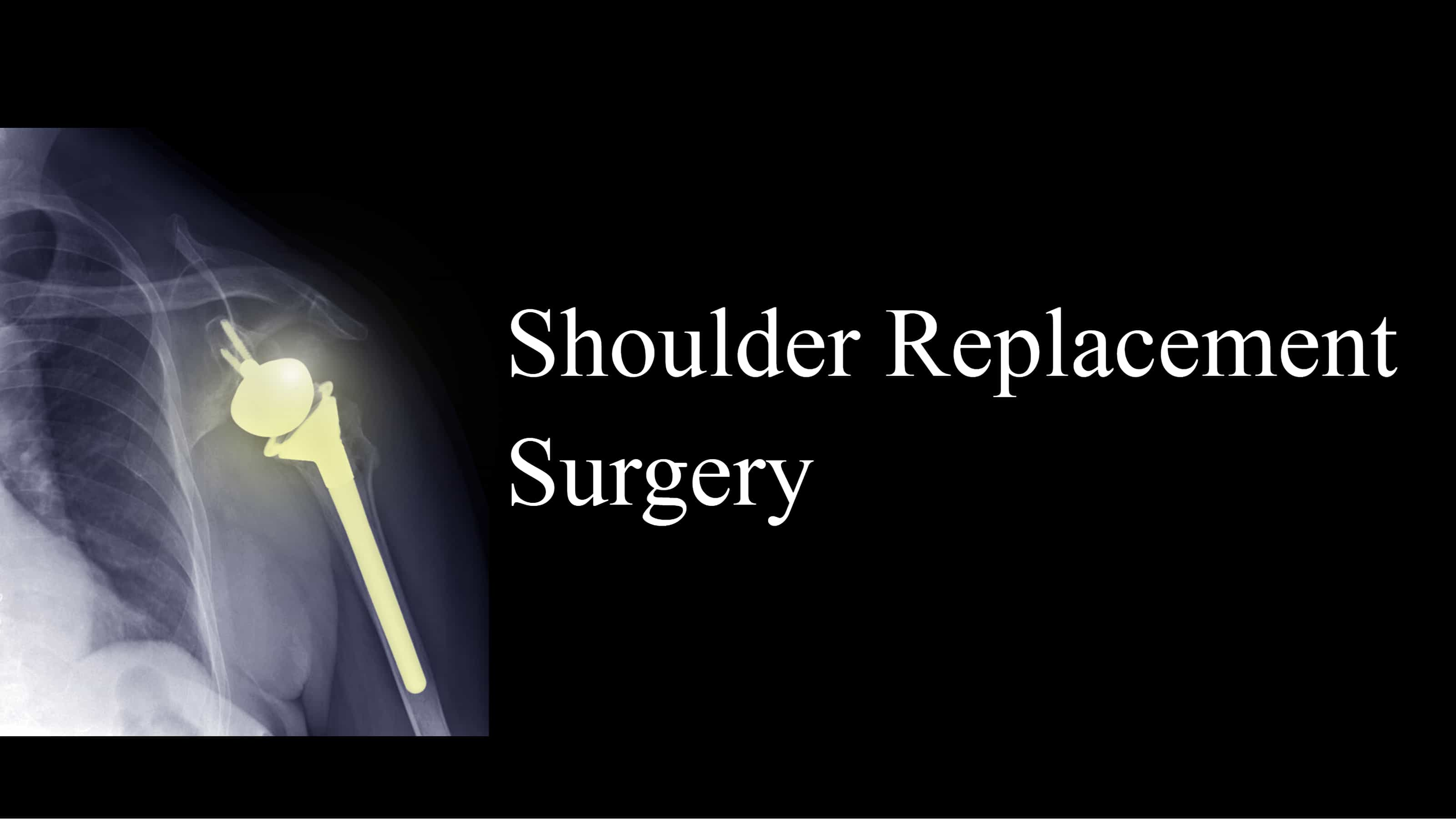SHOULDER REPLACEMENT SURGERY: INDICATION, PROCEDURE, RECOVERY, AND COST

Shoulder replacement surgery is where the surgeon removes damaged shoulder areas and replaces them with artificial parts. The surgeon performs the procedure to improve mobility and relieve pain. You may require a shoulder replacement procedure if you have a shoulder joint fracture or severe arthritis.
Indications/Reasons Requiring Shoulder Replacement Surgery
This procedure is typically recommended for individuals who have a shoulder replacement surgery indication of some type, who are experiencing severe shoulder pain where conservative treatments have provided little to no relief.
Some reasons for shoulder replacement surgery include:
- Rheumatoid arthritis (RA): With this condition, your immune system attacks your joints by mistake which causes inflammation and pain.
- Osteoarthritis: This form of arthritis is common in the elderly. It occurs when you have a wearing away of your cartilage that pads your bones.
- A broken shoulder: Breaking your shoulder bone is a good indication of shoulder replacement surgery to repair it.
The doctor will help you determine if you require a shoulder replacement procedure.
Diagnostic Tools Indicating Need For Shoulder Replacement Surgery (X-Ray and MRI)
To receive a diagnosis and determine if you need shoulder replacement surgery, your doctor will order X-rays. They may also order an MRI (magnetic resonance imaging) to see the condition of your surrounding soft tissues like your rotator cuff tendon and/or a CT scan to evaluate your bone integrity.
If they suspect you might have nerve damage, they might order a nerve conduction study or EMG test to evaluate your nerves that feed your essential shoulder muscles.
Types of Shoulder Replacement Surgery: Total vs Reverse
While all systems of shoulder replacement share the same basic elements — a metal ball resting against a polyethylene (plastic) socket, their designs can vary. Two types of shoulder replacement surgery are:
- Anatomic Shoulder Replacement (Total): In a traditional shoulder replacement, the polyethylene socket is frequently cemented to the surrounding bone, at least partially, so there's an immediate fixation to the bone. There's a stem on the prosthetic ball that's typically placed inside your humerus without requiring cement. Often, the stem prosthesis design promotes osseointegration where your natural bone will grow into this prosthetic material.
- Reverse Shoulder Replacement: The elements are still plastic and metal, but reversed. The surgeon attaches the metal ball to your existing socket and then attaches a plastic socket to your upper humerus, which included the natural anatomic shoulder ball formerly.
The stem is cementless, which promotes bone ingrowth into the prosthesis. Also, the plastic socket has a metal peg, allowing for the growth of your natural bone into your implant.
Is a shoulder replacement right for you?
Click the button below to request an appointment today with Coastal Orthopedics in Corpus Christi, Texas.
Shoulder Replacement Surgery Procedure
A shoulder replacement surgery procedure typically takes around a couple of hours. You may be given general anesthesia, meaning during the procedure, you'll be unconscious. Or, you could receive regional anesthesia, meaning you'll be sedated, but awake.
During the procedure, the surgeon replaces the destroyed joint ball, referred to as the humeral head, of your shoulder using a metal ball. They'll also put a plastic surface on your shoulder socket, referred to as a glenoid. In some cases, they might be able to perform a partial shoulder replacement, which involves them replacing just the joint ball.
After the surgery, they'll take you to the recovery room for a few hours. After you wake up, they'll move you to a hospital room.
Shoulder Replacement Surgery Recovery Time
Shortly after your procedure, you'll be permitted to use your wrist and hand. Complete recovery timelines are typically as follows:
- Six weeks: You might sue your entire arm for light activity, including your shoulder.
- Eight weeks: You might start active, unrestricted use of your shoulder and arm.
- Three months: Many individuals have half of what's a normal range of motion, are reasonably comfortable, and experience some weakness.
- Six months: A lot of patients are free of pain (but might experience some pain in certain types of weather) and experience around two-thirds of a normal level range of motion and strength.
- One year: Around 95% of patients who undergo shoulder replacement will be free of pain. The other 5% will typically experience no pain other than weather-related or periodic pain because of excessive activity. Also, there will likely not be substantial limitations in strength, depending on the deltoid and rotator cuff condition, especially if before surgery these two muscle groups were normal.
Shoulder Replacement Surgery Orthopedic Surgeon
Orthopedic surgeons are committed to diagnosing, treating and preventing disorders of the:
- Joints
- Bones
- Muscles
- Tendons
Some are generalists, while others have certain body area specialties, like:
- Ankle and foot
- Knee and hip
- Spine
- Elbow and shoulder
- Hand
Orthopedic surgeons are experts with a great deal of training in the adequate diagnosis and both surgical and non-surgical treatment of diseases and injuries of the musculoskeletal system.
You should find an orthopedic surgeon who:
- Has experience treating your specific condition.
- Is orthopedic surgery board-certified and specializes in shoulder replacement surgery.
- Accepts your insurance.
- Practices at hospitals with high-quality results in orthopedic care and shoulder surgery.
- Answers your questions and makes you feel comfortable talking with the.
Return to Work Time for Shoulder Replacement Surgery
The precise time you can return to work will depend immensely on the strength and motion of your shoulder and how you're progressing. Usually:
- You can return to desk work in two to three weeks
- You can perform heavier, physical activity four months or more
The presurgical condition of your shoulder tendons and muscles play the biggest role in your recovery time and when you can go back to work. If your tendons and muscles are in good shape before your procedure, rehab will typically be easier.
In all cases, extensive and proper postoperative rehab are important factors in achieving the most benefit of a shoulder replacement procedure.
Narcotics and Pain for Shoulder Replacement Surgery
No doubt about it, shoulder surgery is painful and you'll need something to manage the pain. Just know, the first couple of days will be your hardest, but you'll get better.
There are a variety of ways to manage pain, but a common way is through narcotic medication, such as:
- Hydrocodone
- Morphine
- Codeine
- Oxycodone
- Dilaudid
But, these have substantial side effects and can be very addictive. There's also the possibility of overdose, particularly if you're taking sedating medicine already like sleeping pills. It's important you consult with the surgeon before beginning any narcotic pain management.
How Much Does Shoulder Replacement Surgery Cost
Shoulder replacement surgery often costs around $7,000 to $21,000 or more, but this depends on the implant types used and which hospital your procedure was performed at. A 2007 study by Johns Hopkins University's researchers showed the average cost of shoulder replacement surgery is around $10,351.
Does Insurance Cover Shoulder Replacement Surgery
Health insurance often does cover shoulder replacement surgery. For insured individuals, you can expect to pay a hospital copay of around $100 or more and a 10% to 15% coinsurance for the surgery, which could reach your annual out-of-pocket maximum.
Shoulder Replacement Surgery Rehab
After your procedure, it's essential to begin performing certain exercises to help encourage recovery and strengthen your shoulder.
Your doctor or physiotherapist will prescribe these exercises. They're made to help you gain back your shoulder's strength and range of motion. To be effective and experience the best results follow the exercises as directed and for as long as directed by your doctor. Typically, you begin rehab right in the hospital and then continue when you go home.
Shoulder rehabilitation is a series of exercises you do after your surgery. This helps you get back your shoulder's range of motion and strength. You will work with your doctor and physiotherapist to plan this exercise program. To get the best results, you need to do the exercises correctly and as often and as long as your doctor tells you.
Contact Coastal Orthopedics for Your Shoulder Replacement Surgery Consultation
At Coastal Orthopedics, we understand the importance of being able to live a year-round active lifestyle. We also realize injuries happen. But, you don't need to let injuries get in your way of continuing to live an active life. No matter what you do to stay active whether that's playing sports or engaging in another physical activity like fishing or surfing, we are dedicated to helping you get back to your active lifestyle as quickly as possible.
Contact our office today to set up your shoulder replacement surgery consultation, so we can help you get back to a better quality of life.


